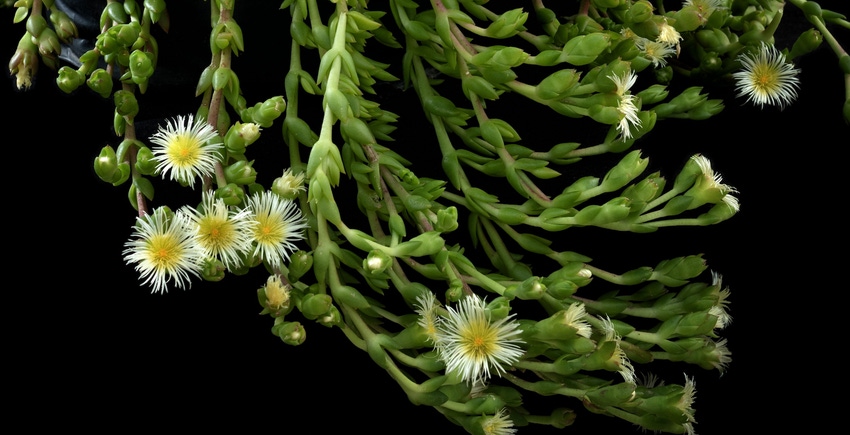Trade group launches to foster South African medicinal herbs
A new trade organization has launched to develop the market for South African medicinal herbs, starting with one colloquially known as sceletium or kanna.

A new trade organization has launched to foster botanical products from South Africa, starting with Mesembryanthemum tortuosum, a species with intriguing effects on mood support.
The new group is known as the Southern African Botanical Products Association (SABPA). It is funded by member fees as well as some government grants, an organization spokesman told Natural Products Insider.
Popular botanical is first target
The botanical which is the group’s first focus is also known by the Latin binomial Sceletium tortuosum as well as the common names sceletium and kanna. It is a succulent with a low growing habit, somewhat reminiscent of the familiar ice plants used as ornamentals in home gardens.
The plant has a long history of use among the local hunter-gatherer populations in southwest Africa where it is native. According to a 2021 paper published in the journal Molecules, the first mention of the plant in Western literature can be traced to a botanical illustration from the 1600s, related to the Dutch colonization of the region.
According to another 2021 paper, this one published in the journal Current Neuropharmacology, sceletium was traditionally used to relieve abdominal pain, quell hunger and enhance mood.
That paper, which was written by Thomas Brendler, Ph.D., along with several others, makes note of the fact many traditional herbal ingredients came to the modern market as a result of colonialism.
Compensating traditional knowledge holders
Today those colonies are almost all part of the past, but the legacy remains. One thing that has changed since then is the advent of the Nagoya Protocol, meant to redress one aspect of that legacy, that being the appropriation of the resources of colonized peoples without much in the way of recompense. Brendler, principal in the consulting firm Plantaphile who is one of the founding members of SABPA, said helping growers and product developers navigate those restrictions is one of the services the new organization plans to provide.
“South Africa has extremely stringent bioprospecting arrangements,” Brendler said. “You are obliged to obtain the necessary permits and come to an agreement with the local knowledge holders.”
“A certain percentage of the profits made go to the local communities. It’s complicated,” he added.
SABPA aims to craft an industry-wide benefit sharing agreement, he said.
Minding the regulatory Ps and Qs
There is already one well-characterized branded sceletium ingredient on the market, Zembrin, which is part of the PLT Health Solutions stable. The ingredient has been under development for years, which has included the institution of a dedicated farm as well as several scientific trials and regulatory filings.
Brendler said a goal of SABPA is to make sure that the rest of the ingredients on the market meet similar standards in terms of characterization, regulatory status and ingredient integrity.
In traditional usage the ingredient was chewed or made into a tea. Most modern developers take the extraction route in order to end up with an ingredient that has a standardized profile.
“Most of the material that is currently in circulation is cultivated. Very little is wildcrafted. It’s not a difficult plant to cultivate,” Brendler said. “But sceletium is extremely finicky and extremely variable.”
The alkaloid content can vary significantly, and manufacturing an extract which can be adjusted during processing for a particular profile seems to be the way to go.
To try to raise that overall quality bar, SABPA will be collecting information for members on analytical methods and helping assemble information for use in GRAS dossiers, meeting FSMA requirements and more, Brendler said.
Supply chain transparency
Another goal of the organization is to bring more transparency to the market. Sceletium has been studied for its effects on depression, and like many such ingredients, it saw a sharp rise in demand during the initial phases of the global pandemic when many consumers were suffering from the stress of that event.
“Maybe two years ago there was a pretty major supply chain debacle. The ingredient caught interest, and nobody had enough supply so the ingredient pretty quickly collapsed as soon as it had risen,” Brendler said. “We are trying to make sense of the local marketplace.”
Additional botanical targets
SABPA has ambitions beyond sceletium, Brendler said. It also plans to help develop the markets for other botanicals, such as South African geranium (Pelargonium sidoides), Cape aloe (Aloe ferox), devil’s claw (Harpagophytum spp.), uzara (Xysmalobium undulatum), Spreng (Lippia javanica), and resurrection plant (Myrothamnus flabellifolia).
About the Author(s)
You May Also Like






.png?width=800&auto=webp&quality=80&disable=upscale)